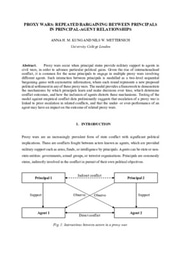Proxy Wars: Repeated Bargaining between Principals in Principal-Agent Relationships
Proxy wars are internationalised conflicts in which principal states provide military support to agent entities. When the same principals are involved in multiple of such conflicts, are there links between the outcomes of these wars? How do principal-agent relationships play into this?
Like
Be the first to like this
Winter, 2021: I first began to wonder how game theoretic models can be used to understand decisions on an interstate level. Proxy wars are far from a new form of internationalised conflict, and their impact cannot be understated; early 2022 was another reminder of the need to more analytically understand the factors contributing to the growing prevalence of internationalised civil conflict, and whether their outcomes can be, in any way, predicted. Using game theory and data from the Uppsala Conflict Data Programme, I spent the summer exploring two research questions: Does escalation in a proxy war affect other conflicts fought between the same principals? And how do principal-agent relationships contribute to the outcomes of proxy wars?


Please sign in
If you are a registered user on Laidlaw Scholars Network, please sign in